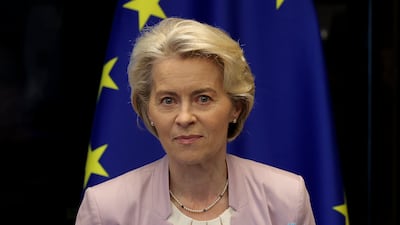Climate and migration are expected to be the main topics addressed by European Commission President Ursula von der Leyen on Wednesday in her last state of the union speech to parliament ahead of next year’s elections.
The highly anticipated speech, in which she will outline her priorities for next year, will be closely watched for clues as to whether she will run for a second mandate – a topic that Ms von der Leyen has not breached publicly.
Members of the European Parliament have lauded her success in navigating Europe’s response both to the Covid-19 pandemic and the war in Ukraine.
Yet she has also become a more isolated figure with the departure in August of her strongest climate advocate, political heavyweight Frans Timmermans, who hopes to become the next prime minister of the Netherlands.
And Margarethe Vestager, her competition commissioner, also recently announced that she was taking unpaid leave to focus on her candidacy to head the European Investment Bank.
In a series of press conferences given at the start of the first plenary session after a summer break, on Tuesday, European MPs in Strasburg did not directly address questions about Ms von der Leyen’s candidacy but said that they expected her to deliver on a recent migration deal with Tunisia.
They also called on her to continue pushing for climate legislation implementation as divisions between political groups widen.
Ms von der Leyen's political family, the centre-right European People’s Party group, recently tried to block legislation pushed forward by the European Commission, including a flagship nature conservation law.
Despite widespread criticism from other political groups, European Parliament's President Manfred Weber defended his record when it comes to supporting the commission's so-called Green Deal, a set of policies aimed at making the continent climate neutral by 2050.
“The EPP voted on 32 out of 34 green files,” he said. “This next chapter means to deliver on the deal on the business case. I want to see European products benefiting form this development, not first of all Chinese products.”
Mr Weber devoted a large portion of his intervention to migration, which he said that Europe had a “moral obligation to solve”.
Referring to the agreement signed in July by Ms von der Leyen and Tunisia’s President Kais Saied, he called for the partnership to “come alive”.
Yet Mr Weber, who heads the largest bloc in the European Parliament, cautioned that the number of migrant arrivals from Tunisia would have to decrease before the EU would disburse funds to Tunis.
“Of course, numbers will have to go down,” he said. “We have to see some movement.”
The EU has offered Tunisia €105 million ($115 million) to fight people smuggling and enable returns but its implementation is to be discussed later in the year.
The deal was criticised by left-wing political parties for overlooking human rights abuses but was described by the European Commission as a “win-win” situation, thanks in part to European investments in Tunisia’s economy and green energy transition.
Questioned by reporters on a recent rise in migrant arrivals to Italy from Tunisia, Mr Weber said Tunisian Prime Minister Ahmed Hachani had told European politicians that it was “driven by the MoU [memorandum of understanding]”.
“There was a kind of panic [that] gripped the country. I think we can always expect to see an uptick before numbers start to dwindle, and of course there has got to be more pressure applied,” said Mr Weber.
Italian Interior Ministry figures compiled by researcher Matteo Villa on Tuesday showed that 31,000 people had landed in Italy from Tunisia in the eight weeks since the agreement was signed with the EU.
But Mr Weber said talks with Tunisia needed to be given “a chance”.
The chairwoman of the socialist and democrats group Iratxe Garcia Perez was more critical of the deal struck by the European Commission with Tunisia, which she described as “externalising border management” while “failing to guarantee minimum rights to asylum seekers”.
Asylum requests in the EU are currently reaching figures comparable to the latest migration crisis in 2015, with the highest numbers of asylum seekers coming from war-torn countries like Syria and Afghanistan.
Ms Garcia Perez called on Ms von der Leyen to continue campaigning hard for the Green Deal.
“There are political forces that want to go back on the level of ambition,” said Ms Garcia Perez.
“Climate change is a reality. We saw that this summer,” she told reporters, in a reference to forest fires and droughts that scarred southern Europe.
Her calls were echoed by the head of centre group Renew, Stephane Sejourne.
“There is a battle of opinions on this topic,” he said, cautioning that while investing in the green transition is important, it must not hurt the economy.
Leaders of the European Greens were more outspoken about Ms von der Leyen’s apparent competing loyalties.
“We cannot deny that Ursula von der Leyen comes from a political family called the EPP, and the strongest pressure to slow down [on the Green deal] comes from the EPP,” said co-chairman of the Green group Philippe Lamberts.
“I hope however that she will stay on course in this year that separates us from elections, and especially if she decides to seek a second term.”
The text of Ms von der Leyen’s speech will be kept secret until it is delivered.


